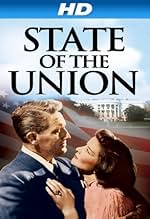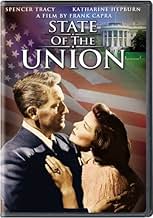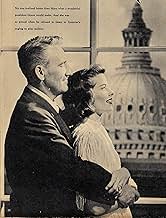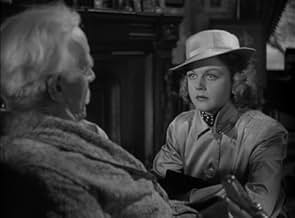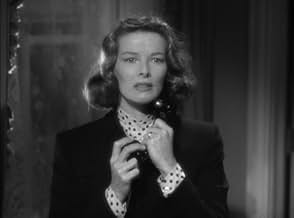IMDb RATING
7.2/10
4.5K
YOUR RATING
An industrialist is urged to run for President, but this requires uncomfortable compromises on both political and marital levels.An industrialist is urged to run for President, but this requires uncomfortable compromises on both political and marital levels.An industrialist is urged to run for President, but this requires uncomfortable compromises on both political and marital levels.
- Awards
- 3 wins & 1 nomination total
Georgie Nokes
- Grant Matthews Jr.
- (as George Nokes)
Featured reviews
State of the Union (1948)
*** (out of 4)
Political drama from Capra has an honest Grant Matthews (Spencer Tracy) being selected to run for President but soon his honest ways are thrown out by a newspaper woman (Angela Lansbury) and a political spinner (Adolphe Menjou). The two of them plan on riding him into the White House but his wife (Katharine Hepburn) begins to have second thoughts on what their turning her husband into. Of all the Tracy/Hepburn teamings this one here is probably the least known, which is a little bit surprising considering Capra directed it and the wonderful supporting cast but on second thought it might be understandable as this isn't the typical film that they'd appear in together. The movie features some terrific performances but a few questionable bits a comedy keep it from being a bigger hit. There were some scenes that I would have left on the cutting room floor including an extremely silly sequence where plane-tag is played. With a few more of the comedic moments edited out you would have been left with a major hit but as is this film still manages to be quite powerful. What really makes the film go is Hepburn and it's funny to learn she got the role by accident after another actress pretty much walked off after certain demands of hers couldn't be met. Hepburn steals the film from Tracy as she really digs in and gives the movie all of its heart and soul and I think the actress really should get this film mentioned more when people discuss her wonderful career. Tracy is once again Tracy meaning that he turns in the expected great performance. The supporting cast includes nice work from Lewis Stone, Van Johnson, Charles Dingle and even Carl "Alfafa" Switzer in a small role. Menjou and Lansbury are very good in their supporting roles of what would turn out to be good villains. Capra pretty much handled this type of material earlier in MR. DEEDS GOES TO TOWN and MR. SMITH GOES TO WASHINGTON but he makes it all seem fresh again here. The ending has a nice punch to it even though you'll certainly see it coming from a mile away. It's rather funny to see how political movies from the 1930s and 40s still hold up perfectly well today but then it's rather sad to see how nothing much has changed in the political world.
*** (out of 4)
Political drama from Capra has an honest Grant Matthews (Spencer Tracy) being selected to run for President but soon his honest ways are thrown out by a newspaper woman (Angela Lansbury) and a political spinner (Adolphe Menjou). The two of them plan on riding him into the White House but his wife (Katharine Hepburn) begins to have second thoughts on what their turning her husband into. Of all the Tracy/Hepburn teamings this one here is probably the least known, which is a little bit surprising considering Capra directed it and the wonderful supporting cast but on second thought it might be understandable as this isn't the typical film that they'd appear in together. The movie features some terrific performances but a few questionable bits a comedy keep it from being a bigger hit. There were some scenes that I would have left on the cutting room floor including an extremely silly sequence where plane-tag is played. With a few more of the comedic moments edited out you would have been left with a major hit but as is this film still manages to be quite powerful. What really makes the film go is Hepburn and it's funny to learn she got the role by accident after another actress pretty much walked off after certain demands of hers couldn't be met. Hepburn steals the film from Tracy as she really digs in and gives the movie all of its heart and soul and I think the actress really should get this film mentioned more when people discuss her wonderful career. Tracy is once again Tracy meaning that he turns in the expected great performance. The supporting cast includes nice work from Lewis Stone, Van Johnson, Charles Dingle and even Carl "Alfafa" Switzer in a small role. Menjou and Lansbury are very good in their supporting roles of what would turn out to be good villains. Capra pretty much handled this type of material earlier in MR. DEEDS GOES TO TOWN and MR. SMITH GOES TO WASHINGTON but he makes it all seem fresh again here. The ending has a nice punch to it even though you'll certainly see it coming from a mile away. It's rather funny to see how political movies from the 1930s and 40s still hold up perfectly well today but then it's rather sad to see how nothing much has changed in the political world.
10stphifer
This is my favorite Tracy-Hepburn film and one of my favorite Frank Capra films. I recommend reading Capra's out-of-print biography, "The Name Above the Title" for the interesting story of the reaction to this film by official Washington in 1948.
Quite reminiscent of "Meet John Doe," the story tests the character of a man against the political power-brokers who want to use him for their own purposes. Ideals battle pragmatism in ways that still ring true 50+ years later.
Angela Landsbury is a wicked woman (can we call her a fem fa tale?) in an amazing performance foreshadowing her role in 1962's "Manchurian Candidate." Adolphe Menjou's sleazy political boss is about a greasy as they come.
All in all there is nothing like a Capra film to make me what to stick to my principles and listen to the people who really love me. Add to Capra's theme of the inherent wisdom of the people this first rate group of actors and you have two hours of time well spent.
Quite reminiscent of "Meet John Doe," the story tests the character of a man against the political power-brokers who want to use him for their own purposes. Ideals battle pragmatism in ways that still ring true 50+ years later.
Angela Landsbury is a wicked woman (can we call her a fem fa tale?) in an amazing performance foreshadowing her role in 1962's "Manchurian Candidate." Adolphe Menjou's sleazy political boss is about a greasy as they come.
All in all there is nothing like a Capra film to make me what to stick to my principles and listen to the people who really love me. Add to Capra's theme of the inherent wisdom of the people this first rate group of actors and you have two hours of time well spent.
`Is there any difference between Democrats and Republicans?' `The difference is that they're in and we're out.' -- A line from State of the Union, one of only a handful of political films to use direct partisan language.
Based on a 1945 play by Howard Lindsay and Russell Crouse, State of the Union marked Frank Capra's return to the political genera. This film is also the third of nine pictures featuring Spencer Tracey and Katharine Hepburn. In this outing, Tracey plays Grant Matthews, a famous aircraft tycoon courted by the Republican Party to become their candidate for President of the United States. The film's title, in addition to referring to the country, is also a metaphor for Matthews' relationship with his wife, Mary (Hepburn). The two are having marital problems sparked by Matthews' affair with a newspaper heir Kay Thorndyke (played by a 22-year-old Angela Lansbury convincingly portraying a woman in her forties).
Once the campaign is underway, the classic theme of a good man sacrificing his ideals in order to win begins to surface. Matthews' speeches are reworked as to not offend any big political establishments (e.g. big business, labor, agriculture, etc.), and soon he begins to loose his own voice along with his identity. Finally, in the film's climax, Matthews is forced to choose between a certain nomination for the presidency or a wife who represents his true character.
Incidentally, for a movie centered on a republican character, State of the Union does not focus on a conventional conservative theme, nor does it only target liberals. The film ribs big business, `the American Dream is not about making money,' in addition to labor. And even though Harry S Truman is the subject of several quips, he was said to have really enjoyed the film, often playing it on his presidential yacht.
At the box office, State of the Union performed better in smaller outlets than large markets. It premiered at New York's Radio City Music Hall to a opening week of $137,000, `this is a bit under hopes, especially in view of intensive advance campaign and strong reviews,' reported Varitey. In Los Angeles, the film opened at No. 1 with $52,000 but `not a smash.' Though in markets such as Minneapolis, Kansas City and Seattle, the film pulled big numbers. Overall the film was a success, but it did not match the box office bounty of Capra's earlier films including Mr. Smith Goes to Washington or the other Tracey/Hepburn parings for that matter (e.g. Adam's Rib, Pat & Mike, Guess Who's Coming to Dinner).
Based on a 1945 play by Howard Lindsay and Russell Crouse, State of the Union marked Frank Capra's return to the political genera. This film is also the third of nine pictures featuring Spencer Tracey and Katharine Hepburn. In this outing, Tracey plays Grant Matthews, a famous aircraft tycoon courted by the Republican Party to become their candidate for President of the United States. The film's title, in addition to referring to the country, is also a metaphor for Matthews' relationship with his wife, Mary (Hepburn). The two are having marital problems sparked by Matthews' affair with a newspaper heir Kay Thorndyke (played by a 22-year-old Angela Lansbury convincingly portraying a woman in her forties).
Once the campaign is underway, the classic theme of a good man sacrificing his ideals in order to win begins to surface. Matthews' speeches are reworked as to not offend any big political establishments (e.g. big business, labor, agriculture, etc.), and soon he begins to loose his own voice along with his identity. Finally, in the film's climax, Matthews is forced to choose between a certain nomination for the presidency or a wife who represents his true character.
Incidentally, for a movie centered on a republican character, State of the Union does not focus on a conventional conservative theme, nor does it only target liberals. The film ribs big business, `the American Dream is not about making money,' in addition to labor. And even though Harry S Truman is the subject of several quips, he was said to have really enjoyed the film, often playing it on his presidential yacht.
At the box office, State of the Union performed better in smaller outlets than large markets. It premiered at New York's Radio City Music Hall to a opening week of $137,000, `this is a bit under hopes, especially in view of intensive advance campaign and strong reviews,' reported Varitey. In Los Angeles, the film opened at No. 1 with $52,000 but `not a smash.' Though in markets such as Minneapolis, Kansas City and Seattle, the film pulled big numbers. Overall the film was a success, but it did not match the box office bounty of Capra's earlier films including Mr. Smith Goes to Washington or the other Tracey/Hepburn parings for that matter (e.g. Adam's Rib, Pat & Mike, Guess Who's Coming to Dinner).
In the 1980 New Hampshire primary, an exasperated Ronald Reagan blurted out the famous line "I'm paying for this microphone!" when a moderator threaten to turn off the microphones at an unruly debate. It was a hugely successful and defining moment for Reagan, nailing down his image as a man of rugged independence who refused to suffer fools gladly -- to say nothing of his ability to craft a clever quip. However, given his Hollywood roots, it seems more likely he consciously or unconsciously lifted this line from Spencer Tracy's character in "State of the Union."
This is an outstanding movie that belongs in the standard viewing repertoire of great movies from the 1940's. There is a reason this movie is not so well known. It was obviously filmed as a big MGM production (you can hear the lion's roar on the soundtrack!) that became owned by Frank Capra's Liberty Films. The script is very intelligent and demonstrates a knowing cynicism of the political world, but much more believable and less sentimental than Mr. Smith or other Capra films. Most people have seen only a few Tracy-Hepburn movies. Hopefully with Hepburn's recent passing the rights owner will produce a digitally restored DVD with background explaining the history and perspective of this seldom seen classic.
Did you know
- TriviaClaudette Colbert was originally cast to play Mary Matthews. A few days before production began, Producer and Director Frank Capra fired her from this movie because she refused to work into the evening. Capra then hired Katharine Hepburn on Spencer Tracy's suggestion.
- GoofsKatharine Hepburn's name is misspelled in the opening credits as "Katherine". This is the result of the original MGM opening credits (MGM was the original theatrical distributor) being replaced by haphazardly-designed replacement credits when MGM's distribution rights expired.
- Quotes
Mary Matthews: Oh, that's silly. No woman could ever run for President. She'd have to admit she's over 35.
- Crazy creditsWhen this film was reissued, new titles and credits were printed. The original end cast listing was retained, so the cast names which are misspelled in the reissue's opening credits are spelled correctly in the closing cast list.
- ConnectionsFeatured in MGM: When the Lion Roars (1992)
Details
Box office
- Budget
- $2,600,000 (estimated)
- Runtime
- 2h 4m(124 min)
- Color
- Aspect ratio
- 1.37 : 1
Contribute to this page
Suggest an edit or add missing content



